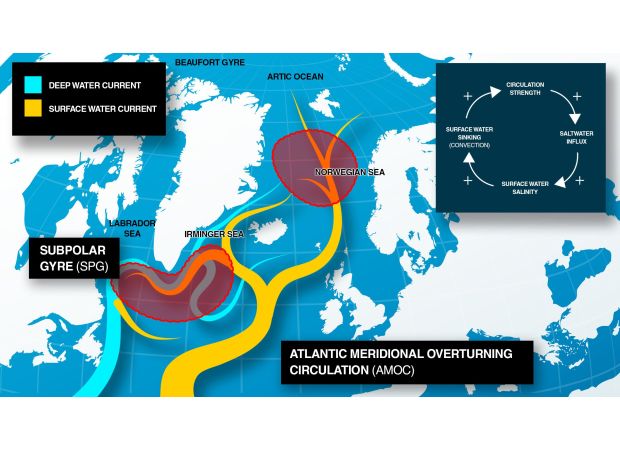The UK is unprepared for a potential risk that could have led to a Little Ice Age.
Possible paraphrase: Climate tipping points could surprise us just like the Covid crisis did.

Ocean currents play a crucial role in keeping our winters mild, bringing warm water from the south. But according to a recent report, this ocean system that we depend on for our comfortable climate could reach a tipping point by 2040, and we wouldn't even know it. The report warned that we are "flying blind" when it comes to the impacts of climate change, as we lack sufficient monitoring and have not addressed the national security risks associated with it.
The unpredictable and catastrophic consequences of climate change could catch us off guard, much like the current Covid pandemic. The report highlights that our current climate models may not accurately reflect the reality, which could lead to unrest and food shortages. This is a concerning issue, particularly for the UK, as we are highly vulnerable to changes in the Atlantic ocean currents. Despite being on the same latitude as Canada, we are fortunate to not have a subpolar climate due to these currents.
However, the report also brings to light the fact that we are not actively monitoring the ocean currents to track their health and stability. This means that we wouldn't even know if the circulation was collapsing until we start feeling the effects, leaving us little time to prepare. The report also suggests that the collapse may have already been triggered by the melting Arctic ice. This joint report by the Institute for Public Policy Research, Chatham House, the University of Exeter, and the Strategic Climate Risks Initiative warns of the potential consequences of this collapse, which could have drastic impacts on our society.
One example of such an impact is the "Beast from the East" phenomenon in 2018, where a ferocious cold snap hit London. This could become more common in a changing climate, as the report states that the Atlantic Meridional Overturning Circulation (AMOC) could collapse much sooner than previously thought, potentially as early as this decade. The AMOC is a massive system of currents that circulate around the entire Atlantic Ocean, playing a vital role in regulating the global climate. As warm water from the tropics cools and evaporates, it becomes saltier and denser, causing it to sink and head south before resurfacing and repeating the cycle.
On a smaller scale, the North Atlantic subpolar gyre, which includes the UK, does a similar job within a local region. The weakening of this gyre has been linked to the "Little Ice Age" in Europe from the 16th to 19th centuries, which had significant consequences for society. The report emphasizes that we need to consider the potential collapse of the subpolar gyre as one of several devastating impacts of climate change that we must prepare for and address.
Lead author Laurie Laybourn expressed the urgency of taking action, stating that we must apply the precautionary principle as these threats are severe and act with haste. The report also highlights the need for climate-security threats to be a core part of national security planning, as the impacts of climate change can have profound consequences on our society.
Tipping points in climate change refer to irreversible changes that can have devastating impacts. These tipping points can occur suddenly and affect other aspects of the climate. For instance, the collapse of large ocean currents, melting ice caps, transformation of the Amazon rainforest to grassland, and death of coral reefs are all examples of tipping points. The report likens these tipping points to leaning back on a chair until it suddenly falls backwards, representing a shift to a new state that we cannot reverse.
The report goes on to explain that some tipping points, such as the collapse of ice sheets, can play out over centuries, while others can happen within a matter of years, making them directly relevant to security decision-making. The collapse of the subpolar gyre is one such tipping point that could have severe consequences if not closely monitored and addressed. The report states that there is a 45% chance of it collapsing this century, and it could happen as soon as 2040.
The collapse of the subpolar gyre, which could take less than ten years, could disrupt the jet stream, leading to more extreme weather patterns, and trigger a collapse of the west African monsoon. This could result in hotter summers and colder winters, impacting agriculture, infrastructure, and public health. With such significant and imminent consequences, it is crucial to have early warning systems in place to support rapid adaptation efforts.
The report also highlights the lack of preparedness for the effects of climate tipping points, despite having signals intelligence for terror attacks and global health monitoring for potential pandemics. Mr. Laybourn notes that there is a growing movement in national security to address the threat of climate change, with the US and Australian governments launching reviews on the subject.
The report emphasizes the need for improved risk assessments to highlight the severity of the threats posed by climate change to the UK, both to politicians and the general public. It also stresses the importance of taking action to manage the unavoidable consequences of climate change and mitigate further damage. The report concludes by stating that the UK needs to face the reality of climate change and take swift action to protect its national security.






